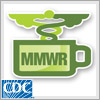A CUP OF HEALTH WITH CDC
Hear Ye, Hear Ye
Identifying Infants with Hearing Loss — United States, 1999–2007
Recorded: February 25, 2010; posted: March 4, 2010
[Announcer] This podcast is presented by the Centers for Disease Control and Prevention. CDC — safer, healthier people.
[Susan Laird] Welcome to A Cup of Health with CDC, a weekly feature of the MMWR, the Morbidity and Mortality Weekly Report. I’m Susan Laird, filling in for your host, Dr. Robert Gaynes.
Unlike many birth defects, hearing loss is not easily recognized. If left undetected, it can lead to serious problems, such as delays in social skills and speech and language development.
Marcus Gaffney is a health scientist with CDC’s National Center for Birth Defects and Developmental Disabilities. He’s joining us today to discuss the importance of screening newborns for hearing loss. Welcome to the show, Marcus.
[Marcus Gaffney] Thank you for having me.
[Susan Laird] Marcus, how common is hearing loss in infants?
[Marcus Gaffney] It affects anywhere from about two to three per thousand births or up to 12,000 kids a year in the U.S.
[Susan Laird] What causes newborn hearing problems?
[Marcus Gaffney] The causes of hearing loss fall into a couple of major categories. The first are genetic causes and those can be problems that actually result in how the ear works, so it really doesn’t function correctly. And there are also various infections that can cause hearing loss, things like meningitis, cyclomegalovirus, things like that. And then there’s also a subset of hearing loss where the cause is actually unknown.
[Susan Laird] What are the consequences of hearing loss in infants?
[Marcus Gaffney] The most common consequence is when the hearing loss isn’t identified early are delays in social skills and speech and language development and that can lead to academic difficulties later on in school.
[Susan Laird] So how would a parent know if their child has a hearing problem?
[Marcus Gaffney] Nearly all hospitals in the U.S. now actually screen infants for hearing loss. Most of the time, the screening’s done before the infant’s ever discharged from the hospital. However, after that screening, it’s still very important for parents to actively monitor their children and if the parents have any concerned that the child may not be hearing correctly, maybe they don’t respond to them the way they thought, they don’t seem to be hearing their toys, things like that, they should definitely speak to their pediatrician about their concerns.
[Susan Laird] So if a screening indicates that a baby has hearing loss, what happens next?
[Marcus Gaffney] Well this really brings us to sort of a critical part in this whole process. If the child doesn’t pass the screening, that’s not enough to know for definite whether they actually have a hearing loss. They’re either going to need another hearing screening or more in depth diagnostic testing which is usually done by an audiologist. If it’s actually found that the infant is diagnosed with a hearing loss, it’s very important that they receive intervention services, and those intervention services can include a whole range of things from just simply monitoring the child to things like sign language, maybe a hearing aid. There’s just a whole range of options in there and that’s something that qualified providers can help parents make educated decisions on what’s best for their child. And it’s very important that the child is diagnosed with a hearing loss as early as possible and that they also get the intervention services as soon as possible because that really does have an impact on the child’s development long term.
[Susan Laird] Where can our listeners get more information about hearing loss in infants?
[Marcus Gaffney] They can actually visit the CDC website which is www.cdc.gov and search for EHDI or E-H-D-I on the A to Z index.
[Susan Laird] Thanks, Marcus. I’ve been talking today with CDC’s Marcus Gaffney about the importance of screening infants for hearing loss.
Hearing problems can lead to serious developmental delays. Early detection enables children to receive services that will help them develop communication and social skills. Make sure your newborn’s hearing has been evaluated and follow up as appropriate.
Until next time, be well. This is Susan Laird for A Cup of Health with CDC.
[Announcer] For the most accurate health information, visit www.cdc.gov or call 1-800-CDC-INFO, 24/7.



